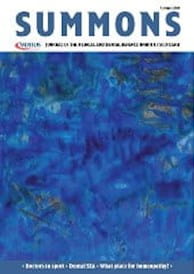IT’S THE TIME of year when I am starstruck. I am a panelist on the programme Inside the Ethics Committee. As a passionate Radio 4 listener, spotting Jenni Murray in the loo, Evan Davis in the BBC canteen and sharing a studio with the Woman’s Hour cooker cause me much excitement. Aside from glimpsing radio idols, participating in the series has been fulfilling and thoughtprovoking, prompting reflection on the relationship between ethics and the media.
Ethics is (despite what medical students sometimes feel) a sexy subject. People’s lives become ‘stories’ daily. Ethical debates rage in the news, on discussion programmes, in broadsheet editorials and tabloid headlines. Ethical issues are a rich source for dramatic work: Inside the Ethics Committee has been accompanied by three plays.
Requests from journalists and producers are common in my working life yet I confess to ambivalence about ethics and its presentation in the media. Whilst I believe ethics should be public and inclusive, media work must be undertaken responsibly, authentically and honestly. When done properly, the media can provide a unique vehicle for ethical discussion.
Most ethical decisions neither are, nor should be, the preserve of ethicists. People make moral choices every day and not just in relation to healthcare. Clinicians and patients share values and negotiate priorities routinely in surgeries, clinics and wards across the land. The perspectives of those who make and live with these daily choices are rarely well-captured. In situations where the media becomes involved, there can be distortion, distress and misunderstanding. Yet, I have learned from my work with Radio 4 in ways I never imagined when I originally agreed to participate six years ago.
The experience of hearing people’s stories, really hearing them properly, is immeasurably valuable. Clinical practice and bioethics are problem-focused. From the earliest days, clinicians learn to sift information, seeking key points, looking for patterns and listening for alarm bells. A skill quickly acquired and required in clinical training is the ability to present, and respond to, a ‘case’. We learn how to translate unstructured descriptions into histories, disparate subjectivity into objectively discernible signs and emotions into manageable agendas. We turn to consultation models and mnemonics to assist in navigating the messy and discomforting worlds of patients.
Many clinicians do this well and have finely-honed communication skills and an abundance of empathy, but even the best will rarely have time to hear the multiple voices and perspectives that imbue moral decisions in healthcare. Both the words and the expression of words matter in ethics and medicine. Yet, we are adept at inferring, assuming and even imposing meaning: individual experience is quickly bundled up in concepts such as autonomy, rights, utilitarianism and best interests.
Consider Emily and Callum, whose experiences were discussed in the final episode of Inside the Ethics Committee. The subject was chronic pain, end-of-life decision-making and assisted dying. I have taught and written about the issues raised in the programme often. In preparation, I mentally listed relevant concepts that should inform the discussion including acts and omissions, the doctrine of double effect, the nature of the therapeutic relationship and the notion of futility.
However, when in the studio hearing Emily and Callum’s stories, the perceptions and anxieties of the clinical team, the emotions and competing priorities, my textbook analysis seemed inadequate. Ethical concepts appeared a simplistic response to the palpable discomfort, uncertainty, hope, expectation and fear. A good decision was not one that neatly parceled the life and death of Emily into an ethico-legal framework. Her words were central, her story was unique, messy, changing, unclear and, at times, redolent with contradiction and regret. We were privileged to share it. The experiences of Emily, Callum and the clinical team involved were not just another vignette to illustrate core ethical concepts at the end of life.
In the programme, clinicians, patients and families come together as equals and all share a common task, namely reflecting on, explaining and describing their experiences in their own words. The vestiges of daily clinical practice are stripped away and what remains is the stuff of life (and death). It is an exercise in revealing that which is hidden, in sharing that which would otherwise not be known and in acknowledging diversity and disagreement.
Working with the media has led me to revisit what I take for granted, to attend to the emotion of ethical decision-making, to listen to every carefully-chosen word and to engage with multiple meanings. Whilst I am not keen on sound bites, I do believe that sound bites and, when we are used to being the expert dealing with that which appears routine, it is important to be reminded of its power.
Deborah Bowman is a senior lecturer in medical ethics and law at St George’s, University of London
This page was correct at the time of publication. Any guidance is intended as general guidance for members only. If you are a member and need specific advice relating to your own circumstances, please contact one of our advisers.
Read more from this issue of Insight

Save this article
Save this article to a list of favourite articles which members can access in their account.
Save to library